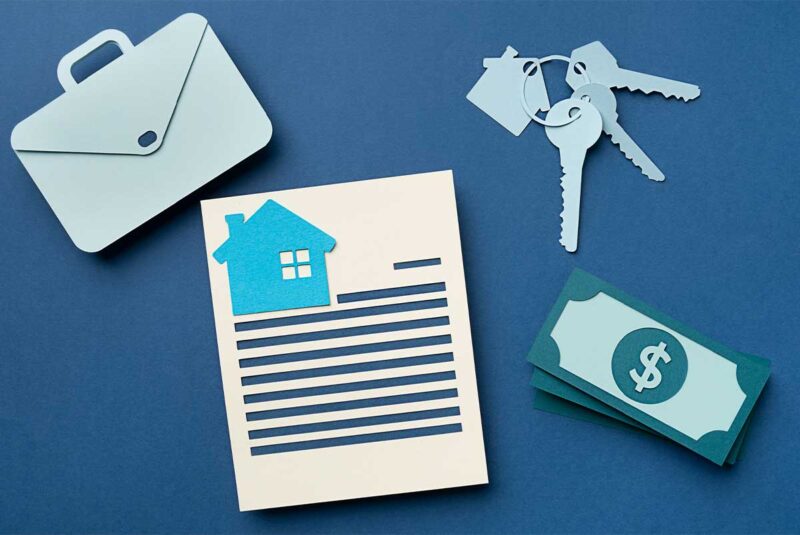Ready To Buy a Home?
Get Approved to Buy a Home
Rocket Mortgage® lets you get to house hunting sooner.
Prospective home buyers may assume that choosing a mortgage lender is all about getting the lowest interest rate. While mortgage interest rates vary by lender and should be a major consideration, there are many other factors, too.
Learning how to evaluate a mortgage lender requires understanding how lenders make decisions regarding mortgage applications.
In this guide, you’ll learn about different types of mortgage lenders, important factors to consider and questions to ask a lender before making a final decision.
What Are the Types of Mortgage Lenders?
Before picking a specific lender, you should consider which type of mortgage lender suits your real estate goals. There are several types of mortgage lenders, and each caters to different consumer needs.
Types of Mortgage Lenders
Conventional lenders are typically banks or similar lending institutions that offer mortgages to home buyers. Many people choose conventional lenders because they come with certain perks, like a loan officer to evaluate your case and provide a more nuanced customer experience.
Credit unions offer many of the same services as conventional banks, but they’re structured differently. While banks are for-profit businesses, credit unions are typically not-for-profit enterprises, which are collectively owned by their members.
You need to be a member of the credit union to qualify for a mortgage with them. You’ll also need to meet many of the same requirements set by for-profit lenders.
A mortgage broker acts as an intermediary between you and mortgage lenders. Essentially, these brokers shop for the best mortgages available to you in exchange for a fee paid by the originating lender.
If you’re worried about finding the best mortgage lender on your own, a mortgage broker can take the burden off your shoulders. Just keep in mind that brokers typically charge a percentage of the total loan amount as their commission, which is reflected in the rate you’ll qualify for.
Portfolio lenders originate mortgages and carry them for the duration of the loan term. After closing, most lenders sell mortgages to agencies like Fannie Mae and Freddie Mac.
However, portfolio lenders keep mortgages in-house. One benefit of choosing portfolio lenders is the potential to access terms and interest rates that don’t conform to those set by larger agencies.
How To Find a Mortgage Lender
Before you can compare different lenders, you need to find them. Here are some ideas to get you started:
- Personal recommendations: Talk to your friends and family members who own homes. They can tell you about their experiences and may be able to recommend smaller lenders you might not have found otherwise.
- Online research: Look for lenders in your area and check their reviews. Make sure to check positive and negative ones to get a fuller picture of the average customer experience.
- Real estate professionals: Often, real estate agents have lenders they partner with regularly, meaning they should at least be able to provide some recommendations to jumpstart your hunt.
How To Compare Mortgage Lenders
Choosing a mortgage lender requires you to think about your needs and how a lender can support them. That said, there are a few common attributes borrowers frequently look for in mortgage lenders, such as customer service, interest rates, closing costs and assistance programs.
Customer service and attention
Quality customer service and attentiveness are always a plus when shopping for a mortgage lender. For first-time home buyers, personalized customer care can be even more important, as you want your lender to walk you through every step of the process. This is why many first-time buyers prefer the help of a mortgage loan officer.
You can also turn to online reviews of different lenders or consult the Better Business Bureau. These resources will help you gauge how well each lender treats their customers.
Differences in interest rates
Mortgage interest rates are indirectly linked to the Federal Reserve, as well as the larger real estate market.
However, interest rates still vary from one lender to another. Your creditworthiness will be one of the biggest factors, but shopping around for lenders will give you a range of interest rates.
Generally, government-backed mortgages offer some of the most competitive rates. You’ll have to meet certain criteria to qualify, but these mortgage loan programs allow you to get a mortgage through a conventional lender, while saving on interest and closing costs.
Closing costs and fees
If you’re more concerned with keeping upfront costs low, you should compare lenders based on their closing cost requirements. Closing costs can include a variety of fees and expenses, including but not limited to:
- Application fee
- Appraisal fee
- Attorney fee
- Closing fee
- Credit reporting fee
- Discount points
- Mortgage insurance premium (MIP)
- Loan origination fee
- Title insurance
- Private mortgage insurance (PMI)
- Title search fees
- Underwriting fee
While this isn’t a comprehensive list of possible fees and expenses, they are some of the most common closing costs. To reduce your upfront expenses, look for a lender who charges fewer fees or is willing to waive certain fees during the negotiation.
Additionally, some lenders are willing to roll certain fees into the loan, giving you the ability to spread these costs out over the life of your mortgage.
Before your closing date, you can learn how much you’ll owe in closing costs in the Closing Disclosure. Your lender will provide this document a few days before you close.
Alternatively, you can request a summary of closing costs from a prospective lender earlier in the process.
Available assistance programs
Closing cost assistance encompasses a wide range of programs offered by government agencies, nonprofits and private sector organizations. Some common types of closing cost assistance include grants, forgivable home loans and low-interest home loans.
If you’re unable to afford a conventional mortgage, find a lender that provides one or more assistance programs. Depending on your eligibility, you may qualify for a Federal Housing Administration (FHA) loan, U.S. Department of Agriculture (USDA) loan or Veterans Affairs (VA) loan.
Home is worth it.
The mortgage process can be exciting, and we’ll be with you all the way. Take the first step to owning a home. You’ll be glad you did.
Tips for Choosing a Mortgage Lender
Getting a mortgage is a process, and finding the best mortgage lender takes time. Fortunately, there are several steps you can take to prepare yourself and start the home buying process on the right foot.
1. Boost your financial standing
It’s extremely important to have a good credit score and debt-to-income (DTI) ratio when you start shopping for mortgage lenders. By paying down debt and building your credit, you can qualify for better mortgage terms, regardless of the lender.
Keep in mind that building credit takes time, so be prepared to work on your credit well in advance. Also, be careful not to apply for too many loans at once, as multiple pulls can negatively impact your score.
2. Find out what type of mortgage lender works best
Once you decide which kind of mortgage lender works best for you, you’ll be able to narrow down your options.
Some factors to consider when choosing a type of lender include how much effort you want to put into the process, your loyalty to certain lending institutions and your willingness to join a cooperative credit union.
3. Choose what type of mortgage you’ll apply for
The type of mortgage you should apply for depends on what you’re looking to get out of homeownership. Each mortgage type will suit different borrowers’ needs.
- Conventional fixed-rate mortgage: A conventional fixed-rate mortgage is best if your finances are good enough to qualify and you want predictable monthly mortgage payments for the life of the loan.
- Conventional adjustable-rate mortgage: Conventional adjustable-rate mortgages (ARMs) are better if you want lower upfront costs and are willing to pay more later.
- Government-backed mortgage: Government-backed mortgages are best for borrowers with low income, those seeking housing in rural areas, veterans or anyone who wouldn’t otherwise qualify for a conventional loan.
4. Compare fees and interest rates
Every lender has its own overhead costs to consider, as well as different levels of risk tolerance.
Typically, lenders with high overhead and low risk tolerance offer higher interest rates and fees, while lenders with low overhead and high risk tolerance offer lower interest rates and fees.
Since there’s so much variation between lenders, you should always compare fees and interest rates during your search.
The underwriting process can also affect the fees you pay. Remember to request documentation of closing costs and other fees from each lender to know exactly how much you would need to pay to process your mortgage.
5. Get preapproved for a mortgage
While getting a preapproval letter doesn’t guarantee a borrower a loan, it does mean a lender is willing to offer a loan to that applicant.
Preapproval letters tell you the maximum amount a lender is willing to lend to you, along with the necessary down payment, interest rate and expiration date. This can help you decide which lender will give you the best deal.
Getting preapproval from multiple lenders is one of the best ways to get an accurate understanding of different costs.
Get approved to buy a home.
Rocket Mortgage® lets you get to house hunting sooner.
What Are Good Questions To Ask a Lender?
Although it can feel daunting to ask your lenders questions, it’s good to get a better understanding of what to expect from the home buying experience. We’ve prepared a few questions to help you determine the right lender for you.
What does the underwriting process look like?
Asking about underwriting can give you an idea of how long the mortgage process will take with a given lender. The length of this process could also affect some of your closing costs.
If you’re on a specific timeline or budget, you might want to find a lender with a shorter (and hopefully cheaper) turnaround time.
How often do loans fail before close?
This is an important question to ask if you want to understand a lender’s efficiency and ability to process a loan all the way to closing. If the lender frequently fails to close, it could be a sign that they’re not functioning well.
Getting involved with a lender with a high failure rate could cost you time and money on processing a loan that won’t close.
According to the National Association of Realtors®, roughly 73% of mortgages are successfully closed.[1] So if you encounter a lender with a failure rate above 27%, you may want to consider looking elsewhere.
What are the closing costs?
Even if you’re early in the process, a lender can give a ballpark idea of what you’ll need to pay in closing costs.
Asking this question can save you time, especially if you’re concerned about the upfront fees and closing costs attached to the mortgage. Knowing whether or not you can afford the closing costs can also help you get a preapproval — or be the reason you go with another lender.
Is there an interest rate lock?
Not all lenders offer a rate lock. This is why it’s so important to ask about it upfront.
A rate lock allows you to “lock in” an interest rate for a set period of time. You can typically lock in your interest rate for up to 60 days, which tends to be more than enough time for the lender to process and close on the loan.
Locking in your rate prevents you from experiencing an unexpected rate hike while the lender processes your mortgage.
However, the downside is you could miss out if interest rates go down.
Finding the Right Mortgage Lending Partner
As you can see, finding the best mortgage lender will require you to understand your budget and specific real estate goals. If you still feel uncertain about the process, consider reaching out to a real estate agent for help.
Ultimately, finding the right lender will come down to which factors matter the most to you — like customer service, closing costs and interest rates.
The Short Version
- To qualify for the lowest mortgage rates, your creditworthiness will be one of the biggest factors, but shopping around for lenders will give you a range of interest rates
- If you’re more concerned with keeping upfront costs low, you should compare lenders based on their closing cost requirements
- Asking about underwriting can give you an idea of how long the mortgage process will take with a given lender
National Association of REALTORS®. “REALTORS® CONFIDENCE INDEX SURVEY.” Retrieved June 2023 from https://www.nar.realtor/sites/default/files/documents/REALTOR_Confidence_Index_052021.pdf




